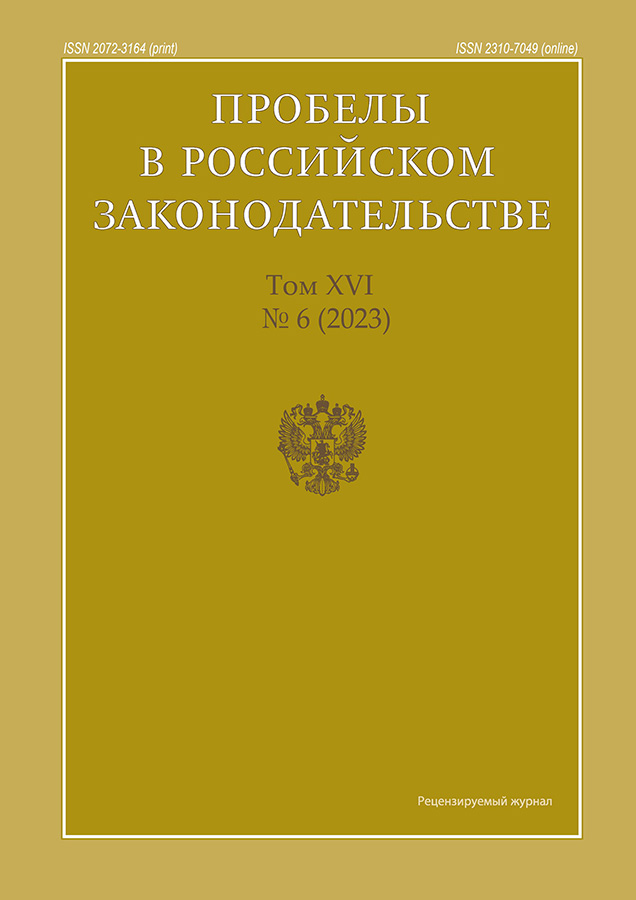The Legal Regulation of Artificial Intelligence Systems in Private International Law
- 作者: Pakshin P.K.1,2
-
隶属关系:
- Higher School of Economics
- Ministry of Digital Development, Communications and Mass Media of the Russian Federation
- 期: 卷 16, 编号 6 (2023)
- 页面: 99-105
- 栏目: Private Law (Civil) Sciences
- URL: https://journals.eco-vector.com/2072-3164/article/view/623581
- DOI: https://doi.org/10.33693/2072-3164-2023-16-6-099-105
- EDN: https://elibrary.ru/LHAHFI
- ID: 623581
如何引用文章
详细
This article analyzed attempts to legally regulate artificial intelligence in private international law. The author notes that the problem of interaction between artificial intelligence and law is becoming more and more urgent with each decade, and the fact that there is no solution to the issue of legal recognition of the actions of artificial intelligence systems in Russian legislation deserves special attention. The author draws attention to the prerequisites for the emergence of artificial intelligence, studies the features of its regulation in private international law, aspects of functioning and the limits of its applicability, as well as legal liability. The author comes to the conclusion that it is necessary to use a flexible approach in which the amount of responsibility initially assigned to the creators of the artificial intelligence system is gradually shifting from the creators to the systems themselves. The author draws attention to the fact that the use of artificial intelligence systems seems promising in the field of harmonization and unification of norms of private international law, as well as monitoring the observance of ethical principles by parties in international arbitration. Speaking about the security of works obtained with artificial intelligence, the author believes that it is possible to recognize artificial intelligence systems as an “author-in-fact”, but the “author-in-law” should be a person. At the same time, the application of the concept of “collective subject” to an “electronic person” is a correlation of the legal personality of artificial intelligence with the legal personality of a legal entity and is the most specific and easy to implement.
全文:
作者简介
Pavel Pakshin
Higher School of Economics; Ministry of Digital Development, Communications and Mass Media of the Russian Federation
编辑信件的主要联系方式.
Email: ppk-center@mail.ru
SPIN 代码: 6333-2450
Scopus 作者 ID: 1137475
expert of the Directorate for Scientific Projects, Moscow chief specialist-expert of the Department of the Development of Artificial Intelligence Technologies of the Department for the Development of Artificial Intelligence and Big Data
俄罗斯联邦, Moscow; Moscow参考
- Vasilevskaya L.Yu. Digitalization of civil circulation: problems and development trends (civilistic research). Moscow: Prospekt, 2022. T. I. 288 p.
- Vykhodets R.S. Policy of the EAEU countries in the field of artificial intelligence // Yevraziyskaya integratsiya: ekonomika, pravo, politika. 2022. V. 16. No. 3. P. 106–117.
- Krysanova N.V. To the question of legal personality and legal development of artificial intelligence // Sotsial'nyye i gumanitarnyye nauki. Otechestvennaya i zarubezhnaya literatura. Seriya 4, Gosudarstvo i pravo : Referativnyy zhurnal. 2021. P. 23–31.
- Filipova I.A. Artificial intelligence in the system of labor relations, taking into account the concept of service work // Pravo intellektual'noy sobstvennosti. 2020. No. 1 (59). P. 21–25.
- Khisamova Z. I., Begishev I.R. The essence of artificial intelligence and the problem of determining legal personality // Vestnik MGOU. Seriya: Yurisprudentsiya. 2020. No. 2. P. 96–106.
- Shakhnazarov B.A. Legal regulation of relations using artificial intelligence // Aktual'nyye problemy rossiyskogo prava. 2022. No. 9 (142). P. 63–72.
补充文件








